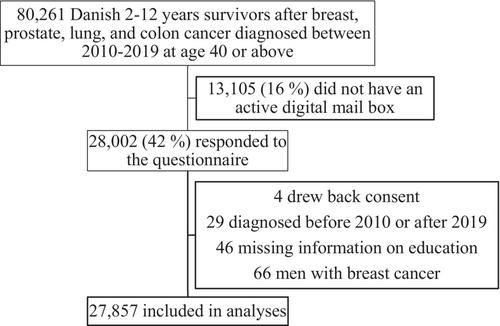Social inequality in cancer survivorship: Educational differences in health-related quality of life among 27,857 cancer survivors in Denmark
Abstract
Background
With a growing population of cancer survivors in Denmark, the evaluation of health-related quality of life (HRQoL) has become increasingly important. We describe variations in HRQoL between educational groups in a national population of cancer survivors.
Methods
We conducted a cross-sectional questionnaire study among breast, prostate, lung, and colon cancer survivors diagnosed in 2010–2019 in Denmark. We used the EORTC QLQ-C30 to assess HRQoL including physical, role, emotional, cognitive, social functioning, and symptoms (fatigue, nausea and vomiting, pain, dyspnea, insomnia, appetite loss, constipation, diarrhea, and financial difficulties). Information on educational level and clinical data were extracted from national registers and clinical databases. Levels of impaired functioning and severe symptoms were identified using newly established thresholds for clinical importance. Multivariate logistic regression was used to examine associations between education and HRQoL. All statistical tests were 2-sided.
Results
In total, 27,857 (42%) participated in the study. Up to 72% and 75% of cancer survivors with short education (≤9 years) reported impaired functioning and severe symptoms, respectively. Cancer survivors with short compared to long education (>12 years) were more likely to report impaired functioning and severe symptoms, with for example significantly higher odds ratios (ORs) for impaired physical function (breast OR = 2.41, 99% CI = 2.01–2.89; prostate OR = 1.81, 99% CI = 1.48–2.21; lung OR = 2.97, 99% CI = 1.95–4.57; and colon cancer OR = 1.69, 99% CI = 1.28–2.24).
Conclusions
Cancer survivors with short education are at greater risk of impaired HRQoL than survivors with long education 2–12 years after diagnosis. This underscores the need for systematic screening and symptom management in cancer aftercare, in order to reach all cancer survivors, also cancer survivors with short education.


 求助内容:
求助内容: 应助结果提醒方式:
应助结果提醒方式:


